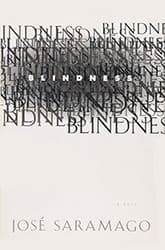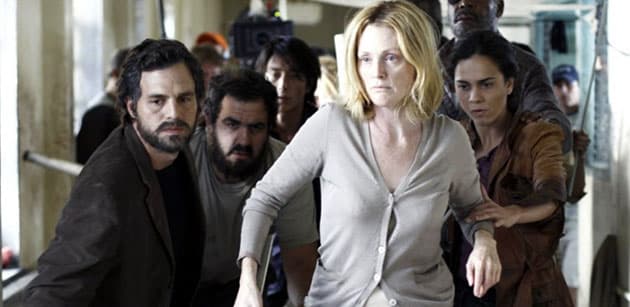Blindness
Critique • Quotes • At the movies
 First U.S. edition
First U.S. editionOriginal title
Ensaio sobre a cegueira
First publication
1997
Literature form
Novel
Genres
Literary, post-apocalyptic
Writing language
Portuguese
Author's country
Portugal
Length
Approx. 134,500 words

Julianne Moore's character leads the blind including her doctor husband (Mark Ruffalo).
Good try at an impossible adaptation
Blindness (2008): Film, 121 minutes; director Fernando Meirelles; writer Don McKellar; featuring Julian Moore, Mark Ruffalo, Alice Braga, Danny Glover, Maury Chaykin, Yusuke Iseya, Yoshino Kimura, McKellar
It's easier to understand why Blindness was not a popular film than it is to understand why the novel was adapted as a film at all.
Not that it's a bad film. It's a very good film.
But the appeal of the material of José Saramago's bleak book is quite limited for visual presentation. Most of the characters spend most of their time without sight of anything except a milky whiteness. The characters have no names and seemingly no backgrounds. Even the country and times in which they live is hazy.
Moreover, what the one seeing character sees—and what the blinded experience—is violent, vicious and disgusting. Organized rape, subjugation of the weak, and fights to the death over food scraps become common.
Lost, hungry and fearful people spend their days trudging through human excrement and the detritus of a former consumer society.
How could this possibly be turned into a movie to please the masses?
Canadian screenwriter Don McKellar and Brazilian director Fernando Meirelles do their best and, though the result is far from "pleasing", it is affecting. Not in a soppy, emotional sense—although there is a little more sentimental payoff in the film than in Saramago's novel—but in drawing us into the desperate situation of the characters, making us think about how much social cohesion is based on visual cues and how easily the veneer of civilization can be swept away.
Trailer for 2008 adaptation of José Saramago's 1997 novel Blindness.
It helps that the international cast of actors unknown to North American audiences is led by Hollywood stars Julianne Moore, Mark Ruffalo and Danny Glover. They're all convincing.
The filmmakers get around the problem of everyone being blind by presenting most of the film through the eyes of the one seeing character, the doctor's wife played by Moore, who becomes the leader of their small group. While the book gives near equal time to all the characters, the film focuses mainly on the story of the doctor (Ruffalo) and his wife.
Nonetheless, Blindness the film is quite faithful to Blindness the film. No one could reproduce the effect of Saramago's eccentric prose in cinematic terms, but Meirelles's cameras and editing add the director's own artistic flourishes to the tale, enriching it, deepening the allegory.
Much of the film plays like a horrible dream. The cause of the blindness, its nature and what it represents are never explicitly outlined, any more than they are in the book, leaving it to audiences to ponder on their own.
This appears to have annoyed many critics—and no doubt many viewers—who found it too grim, overly serious and without the stirring, fantastic elements expected in movies with mass market appeal.
These critiques are understandable, but they shouldn't keep fans of serious literature from appreciating one of the better film adaptations of a modern classic.
— Eric

